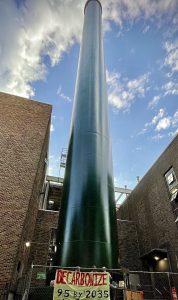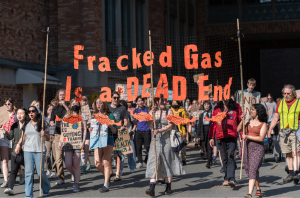From Knowledge to Power: The PCC Could Lead Climate Action – Here’s Why it Must
By Brett Anton
In the last few weeks of my UW education, I was struck by something one of my professors left me with. “If this is how scared the scientists are…” he said, and then just trailed off. It was not a joyful sentence to finish, but the professor, a member of the ESS department here at UW, had a point. The people who know the most are scared. Not just because of the results in their labs. But because the institutions which surround them seem to be doing not nearly enough about it.
I know what it’s like to feel that fear. I’ve had late-night, spiraling conversations about what happens if, fifty years from now, action isn’t any better than today – if politicians are still approving pipelines and a lack of corporate accountability peddles fake solutions over real climate action.
We are in a better position, though, than the vast majority of people in this world to make sure we never go down that path.
I’ve been driven recently by a quote from famous author Ibram X. Kendi. To those placing BLM signs in their front yards, Kendi offers a powerful affront: or rather, redirection. He writes: “Knowledge is only power if knowledge is put to the struggle for power. Changing minds is not a movement.”
Whether or not we accept it, members of the PCC possess knowledge that can and must be put to the struggle for power, if we wish to see change. As one of the ten strongest programs around climate change in the world, our choice between observing and changing is becoming clearer by the day.
The climate crisis (timed with a powerful El Niño) made this summer the hottest global summer on record. Wildfire smoke in Seattle made me and my asthmatic friends indoor creatures, cramping our ability to build outdoor community – young children with asthma (primarily BIPOC) continue to lose chunks of their summers to these ideas.
At UW, I’ve been lucky enough to be surrounded by a climate justice community which recognizes our local ability to lead, and reverse a national trend on action that usually feels like – “wait, are people noticing?” Institutional Climate Action, Resist US-Led War, the Environmental Policy Student Association, and more form a coalition demanding environmental leadership right in our backyards – at the University itself.

The University is one of Washington’s worst climate polluters. The Methane Power Plant run by UW – on the Seattle campus, down by the Burke Gilman trail – is the 16th highest-GHG producing power plant in the state, and given that methane leak rates keep exceeding expectations, it may be even worse. UW’s close ties with the fossil fuel industry mean that Exxon, Occidental Petroleum, and Shell are all on the donor laureate wall at Suzzallo Library, even though we know that these financial ties corrupt our educational institutions. UW also has close ties (via Boeing) with the American defense industry – the globe’s single worst climate polluter, which has made entire nations (like the Marshall Islands and Viet Nam) environmental sacrifice zones.
UW’s crises of climate are often crises of justice as well – UW’s downtown buildings aren’t just some of the city’s worst GHG emitters but have spent time in the headlines for resisting affordable housing requirements, and UW’s choice of methane gas from Canada contributes to the Missing and Murdered Indigenous Women and Persons crisis.
Although some administrators and departments have been receptive to demands for change, as public funding for Universities broadly has fallen across decades, the UW has rapidly privatized. We’ve generally chosen to follow societal trends around environmental action – raising a too-little too late 2050 as a potential date for building decarbonization, refusing to ban fossil fuel recruitment at our Career Center even after public pressure.
A different world is certainly possible: The University of California system has been a bold leader, setting a 2025 net zero date which changed the conversation around climate timelines. The University of British Columbia is similar, working towards a 2030 net zero date. Yet despite our climate knowledge, we don’t sit on these leading flanks of climate action. The UW lags behind.
So, I welcome you into a chance for change and leadership. The movement is already alive.

With scientific knowledge and community experience, hundreds of students marched through campus last May to demand the UW move 95% off fossil fuels by 2035 and cut ties with major fossil fuel corporations. We met with President Ana Mari Cauce and moved UW’s decision-making on decarbonization to the UW Board of Regents. In preparation for the Regents’ decision this coming November on that 2035 date, dozens of students lined the halls of Suzallo-Allen Library in June, some sacrificing their own departmental graduations.
We were “dying-in,” with 22 of us holding specific signs to represent the 22 additional deaths caused by one year of UW’s Methane Plant pollution.
Faculty and the broader community have begun to hop in by our side. Professors co-wrote our demand manifesto to UW President Ana Mari, attended our protests, and shared the event out to their classes. Our partners in the organizing space, at 350 Seattle, Third Act, Stop the Money Pipeline, and more kept us safe during the rally, helping de-escalate when a motorcyclist committed vehicular assault against the crowd. We need that professor and community support more than ever now.
Our professor sign-on sheet is attached at this link, and it will be crucial for professors to share that within their circles, especially with the Regents’ final decision coming up very soon. In lieu of a student petition, we ask interested student members to call the Regents and share their support for action. We ask faculty, students, staff, or anyone else to sign up and organize with us. We’re a grassroots movement, a movement of the people. That means our movement – and any movement for climate justice – is only strong when the most concerned and affected people decide to put in time.
If you’re reading this, at least the former applies to you.
Having seen students engage in the hundreds, and faculty serve as key mentors and participants, the climate justice movement here at UW has served as an inspiration and a tool for change. Join in.
Brett Anton is a climate justice organizer who recently graduated from the UW with a Political Science Major and a Climate Science Minor. As part of the Spring 2023’s PCC Seminar (ATM S/ESS/OCEAN 475/586) taught by Interim Director LuAnne Thompson, he created “An Impacts Approach to Decarbonizing University Systems” which can be found at this link. He now organizes with the Colorado Sierra Club and can be contacted at 253-307-9152 if you have questions, concerns, or want to get involved with the UW/Seattle climate justice movement! He also welcomes folks to join or connect with ICA, a UW climate justice organization, at this link. He notes that “it’s easy to join, and any amount of time helps!”